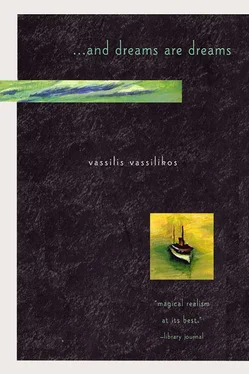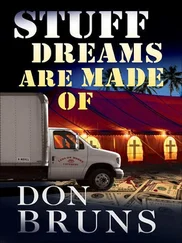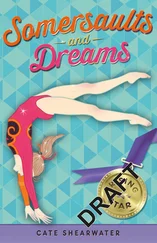“to be a writer.” To convert, like a hydroelectric station, the power of the waterfall of life that flows wastefully, plummeting stupidly down ravines. To collect it drop by drop and turn it into energy, which then becomes light in lonely light bulbs in rooms or street lamps, as they turn on with the coming of evening. Ah! The torment, the sweet torment of the imagination. At last I felt as if I were slipping gradually into a deep sleep.
I woke up around noon, shaken by a nightmare, with the boom of the Gianicolo cannon, which, at that hour, always banged its fist against my window.
I looked around me. I saw Rosa’s three red roses, which I had been keeping even though they had died, in the vase with no water. The sweet figure of Rosa, forever lost, forever a dream, was inside a crystal ball.
I couldn’t touch her; she was like a pair of kidneys being transported in serum for transplantation into kidney patients. The nightmare that had shaken me awake at the moment the cannon was fired was the realization that I had suddenly become very poor. That I had run out of money, and that not only had I not been sent here by a publisher, but that I myself was paying for the luxury of being away from my country, which exasperated me. I loved my country and at the same time I hated it because it deprived me of the possibility of loving it while I lived in it. My country was like a woman, a beautiful adolescent in love who, after marrying me, had begun putting on weight and neglecting herself, so that even while I knew that underneath she was the same person, her appearance repulsed me. Perhaps it wasn’t her fault. Maybe I was also to blame.
So in my dream I was poor. I didn’t have a dime.
To be exact, the few savings that I did have left would also have to be tossed onto the altar of my art, to be sacrificed to my art that nobody wanted anymore. That would be the end of my independence. Then I would have to roll up my sleeves and start making a living.
As I did when I was young, when I was starting out in life, without any support, without a penny in my pocket, with a desire to change the world, to make it better. With faith in victory. But now, in my dream, I was no longer young. And even if I had the same faith, I didn’t have the same courage, the same ignorance as I did then. “This parenthesis of twenty years has lasted too long,” said the old flower lady in my sleep.
“Why so, my good lady?” I asked.
“Because you’ve known me for twenty years. I’ve been watching you. Now you will never see me again.
I was your fate. Take these red carnations and scatter them on the grave of Panagoulis. It’s been ten years since he was assassinated. Don’t forget him.”
I sprung up in bed. The cannon was still booming.
Twelve times. But what was worse was not that I had dreamed of the old woman, but that my dream was a reality that I had repressed so as to devote myself fully to the joy of creation. And it came, deviously, like a thief in the night, out of the underground tunnels that carry our dreams, to shake me up, because there are torture dreams, on racks, sacrificial altar dreams to the Thermidors of sleep, from which you awaken with a start, only to discover that they are anything but dreams, that they are nightmares of irrefutable reality.
And now I, the celebrator of dreams, the author of
… And Dreams Are Dreams , the existentialist of dreams, had to pay the nightmare bill of my hotel, where I had spent almost two months, calling dream friends and dream lovers, dream interpreters and dream critics. And it is well known that hotels always inflate their guests’ phone bills. That is how they make their money, the same way restaurants make money from their bar, from alcoholic drinks, and not from food. It is the same with hotels. The price of the room is nothing compared to all the other expenses, which, when added up, spell disaster.
I went downstairs to ask for my bill.
“Are you leaving?” asked the frosty accountant, to whom I had given a small deposit, but who was waiting, without pressing me, since I was a resident at the hotel and had been recommended by a friend of his, to see when I would finally pay him.
“I’m not leaving just yet,” I explained, “but I would like to know exactly how much I owe.”
“I see you have made a lot of phone calls,” he said, as if to prepare me.
“That is precisely why….”
He started tapping away at the adding machine at lightening speed. It sounded like a machine gun, the same way my typewriter sounds in moments of inspiration. He was making me sick. His cold gaze, his expertise at hitting the keys that for me translated into the blood of my veins, all this suddenly made me realize the absurdity of my enterprise. To exile myself to a city, to write… what? When I had nothing to say, when nobody wanted anything from me, when my art of storytelling was made obsolete by the facts themselves? And as I watched him machine-gunning the interminable column of phone calls, coffees, mineral waters, never ending, like a list of heroes fallen in battle (but in which war? Who was the enemy? Under whose orders? Who were its generals?), I remembered all the times I had said to myself, in this city or elsewhere in the world where I had wandered, that all people have a specific job: one is a bellboy, the other an accountant, one is a priest, the other a trade unionist, a news agent or a hair stylist, a clerk or a politician, a cop, a stool pigeon, a fashion model, and only I and those of my kind, without even being eligible for its benefits, for whom a workers’ strike would have no meaning (have you ever thought what a poets’ strike would mean?), we enjoyed the luxury of having insight into a world that, alas, had never had any use for this insight but that would not have existed without it. I always felt a little out of place, a little useless, “ like classical music in a tavern .”
Now the amount I had to pay was horrific.
“Have I made a mistake?” cried out the
accountant at the sight of the total, which was so huge even he could not believe it. “Did you actually make so many phone calls?”
“How much does it come to?” I asked through clenched teeth.
The amount he told me hit me like a ton of bricks.
It was the kind of number one only dreams about. It unfolded like the stream of subtitles that accompany news programs for the hard of hearing. A streamer of numbers thrown at a carnival. What was I dressed up as? I saw myself as Saint Francis of Assisi and the old woman as the Holy Virgin. Her grace was abandoning me. She had been my good fate and she was leaving me.
“No, no, it can’t be. Let’s start da capo (from the beginning),” said the accountant from behind his window, while I continued to smoke more and more nervously.
But his da capo hit me. It was Capodistrias whom I had spent the most time studying and telephoning in the great beyond so that he could tell me what had happened before he was assassinated by Petrobey Mavromichalis in Nafplion one day on his way to church. A black dagger from the Mani.
“There must have been a mistake,” said the accountant. “Technology is subject to errors, you know.”
“So is logotechny ,” I started to say, but the play on words didn’t work in Italian.
“It can’t be, it can’t be,” he kept muttering. “I’ve been working here for years. So many people have come through this place. Celebrities calling everywhere, all over the world. And yet I’ve never had a bill like this before.”
“Well, of course, I have been staying here for two months,” I attempted.
“But there have been others who have stayed for six months. Even twelve. Take the witch. She stays here all year round. She calls her clients who live in every corner of the earth. She’s never had to pay so much.”
Читать дальше












